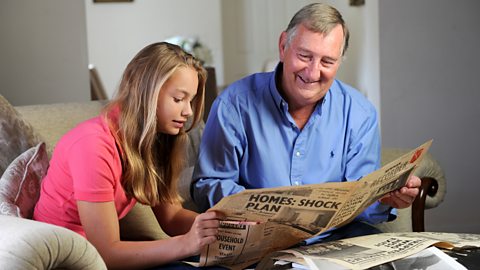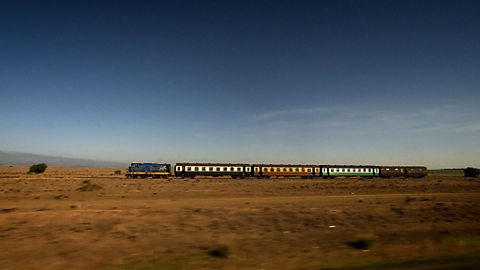NARRATOR:'Britain was still in shock after the war finished in 1945.
NARRATOR:'Much of the country was suffering from the effects of bombing
NARRATOR:'Food was still rationed and half a million men had been killed in combat.
NARRATOR:'As a result of this loss of life there was a huge shortage of workers.
NARRATOR:'The Labour government swept to power in 1945, with a promise to rebuild the country.
NARRATOR:'And they needed immigrants to come to Britain to help.
NARRATOR:'Elliot is the grandchild of one of those post war migrants. He's 15 and lives in London.'
ELLIOT:It's always good speaking to old people 'cause they always have interesting stories in their life.
ELLIOT:When my grandma tells me stories about their life together it makes me want to ask questions to my grandad as well.
NARRATOR:'Elliot's grandfather, Phillip, arrived in London in 1949.
NARRATOR:'Unlike the majority of new comers, he stowed away on a ship from Ghana in west Africa, looking for a better life.
NARRATOR:'They're visiting London's docklands, to see if Phillip can remember the place where he arrived, 64 years ago.
PHILLIP:You got all these buildings are new. All these buildings.
ELLIOT:What was there then? Do you know?
PHILLIP:No, no it's all a big harbour. You see a lot of ships.
PHILLIP:Before we landed, in the night, very beautiful.
ELLIOT:Yeah.
PHILLIP:The lights, you know.
ELLIOT:Everywhere.
PHILLIP:Everywhere. Lights. Beautiful.
ELLIOT:Were you excited, or nervous?
PHILLIP:Yeah, yeah we were excited.
NARRATOR:'Although Ghana was a British colony, and many of its citizens had been welcomed here,
NARRATOR:'Phillip had travelled here illegally and on arrival, spent two weeks in prison.
NARRATOR:'Once released, he was given an identity card to help him find work.
NARRATOR:'However, even though work was plentiful Phillip was surprised that not everyone was well off.'
ELLIOT:So you thought everyone was going to be rich when you came here?
PHILLIP:Yeah. We saw people begging.
PHILLIP:I went to a tube station, first time, tube station and the writing "beware of pickpockets." So I said, pickpocket?
PHILLIP:We thought white man don't steal, you know.
NARRATOR:'Elliot wants to know why thousands of people left their homes to get here.
NARRATOR:'He's come to see Dr Charlotte Riley an expert on British post war immigration.'
ELLIOT:What made people come to Britain?
DR CHARLOTTE RILEY:Britain is, it's been physically destroyed by the war - there's been lots of bombing, it needs lots of rebuilding.
DR CHARLOTTE RILEY:The British government tries to get people to come over Britain to do lots of manual labour jobs, so lots of building.
DR CHARLOTTE RILEY:Certainly people from the Caribbean were encouraged to come over to do building work and things like that.
DR CHARLOTTE RILEY:The new NHS, which was set up just after the war, that was a really big employer of people as well
DR CHARLOTTE RILEY:So, in 1949 the British government started to do campaigns in the West Indies and in other places around the Empire to try and get nurses to go over.
DR CHARLOTTE RILEY:And lots of people came over for an adventure as well - they wanted to see what Britain was like.
NARRATOR:'Gloria Bailey was another immigrant who arrived from Jamaica with her husband.
NARRATOR:'She became a prominent member of the local community
NARRATOR:'And Elliot wants to find out how her experience compares to his grandad's.
ELLIOT:What did you do for work?
GLORIA:At first I got a job into a nursery.
GLORIA:Looking after some little children - they were all white children who were very petrified.
GLORIA:Wondering why we lookedβ¦
ELLIOT:Yeah.
GLORIA:different.
GLORIA:And my husband had a job at London transport.
ELLIOT:What were you expecting of England when you came?
GLORIA:Well, we thought that there would be lovely houses and streets were all sophisticated but we were rather disappointed, when we came.
GLORIA:It took a very long time to get used to the weather. Took ages, as a matter of fact. And with the foods. There wasn't much of West Indian foods at that time.
GLORIA:So we were chiefly eating, sort of, the English food. The fish and chips was something we were very excited about.
GLORIA:We were quite lucky. Probably because we were a couple.
GLORIA:But many people just came on their own, most of them men.
GLORIA:With their felt hats, and their suits.
ELLIOT:Yeah.
GLORIA:You know?
GLORIA:And I've seen big men cry! Because they're not used to being on their own.
NARRATOR:'The arrivals bought with them new cultures - food and music. And helped create a rich and vibrant post war scene.
NARRATOR:'The Nottinghill carnival was first held in 1964. And was based on Caribbean carnivals of the early 19th Century. Which celebrated the aberration of slavery.'
GLORIA:It started a very small number of people
GLORIA:The West Indians and Africans - people sort of curious and even the white people were sort of a bit nervous about going there, not knowing what to expect.
GLORIA:But the numbers increasedover the years. And there were so many people going there - everybody dressed up in their original, or tribal, clothing.
GLORIA:And more and more white people, all nationalities, were uniting. People were bringing their children there.
DR CHARLOTTE RILEY:Britain has always had lots of people migrating to it and so British culture has always been constantly evolving through history.
DR CHARLOTTE RILEY:But this big influx of migration after the second world war changed British society quite dramatically and quite quickly in some areas.
DR CHARLOTTE RILEY:And then that changed wider British culture so Britain got more interested in things like Jamaican music or Indian food.
ELLIOT:Hello.
NARRATOR:'After 10 years of working in England, Phillip met and fell in love with Elliot's grandma, June.'
JUNE:Come in.
JUNE:Yeah, take your shoes off, good boy.
NARRATOR:'They've been married for 53 years and first met in a fish and chip shop.
JUNE:When I got my cod and chips, I didn't have my money with me so I sort of stood there. A voice from behind me said, "Oh, I'll pay for you."
JUNE:So when I turned around, it was Opar, well of course, I didn't know him then butβ¦
JUNE:So I said, "Oh no. It's alright." you know I was quite bristly and he said, "No, no it's OK." And he put the money out, you know, and from then on, you know we just struck up a friendship and, yeah, we just became a pair, you know.
JUNE:We had a lot of difficulties of course. Unfortunately we found that people weren't happy to have mixed race couples in their house.
JUNE:Black people had houses and because of the prejudices they suffered they would say no white people.
JUNE:No whites. And then white people who had houses to rent didn't want black people so we were sort of stuck in the middle.
JUNE:There was sort of a card outside saying no blacks, no children, no animals.
ELLIOT:So you were treated like dogs?
JUNE:Well, you were putβ¦
ELLIOT:Put in the same category?
JUNE:Exactly. Yeah. It was very hurtful.
JUNE:Very upsetting, you know.
ELLIOT:Yeah.
JUNE:But what can you do? That was the life I chose. Or we chose. So we had to get on with it basically.
ELLIOT:It was strange walking past and seeing signs everywhere, was it?
JUNE:Well, yeah. It definitely beagainst the law now. Took quite a lot of courage.
ELLIOT:I've learnt a lot of things that I didn't know before. Like they were judging them on the colour of their skins.
ELLIOT:It's really shocking.
ELLIOT:They grew up quite quick, I would say, actually. Nowadays, you tend to be a child a bit longer You wouldn't mature as quick.
ELLIOT:They were so brave because they put up with a lot of things.
ELLIOT:Why would you want to travel, on a boat, to a different country when you're quite young, just for the adventure. Yeah, that surprised me.
Video summary
15-year-old Elliot hears memories of the Windrush generation's experiences of post-war London from his grandparents and family friends.
Elliot's grandfather Philip arrived in Britain in 1949 as a stowaway on a ship from Ghana.
As the ship sailed up the Thames, Philip had his first sight of his new home, βBefore we landed, in the night it looked very beautiful with lights everywhere, we were excited," he recalled.
After the ship docked, as he had arrived in the country illegally, Philip found himself imprisoned for two weeks.
On release he was given an identity card and set about finding employment.
He remembers being surprised that although work in post-war Britain was plentiful there was still much visible poverty around, βWe saw people begging," he remembered.
"I went to a tube station for the first time and saw a sign βBeware of pickpockets.ββ
'No blacks.'
Elliot's grandmother June met Philip in a chip shop. As a mixed race couple they recall experiencing many difficulties in a country that at the time could still be hostile and unwelcoming to immigrants.
βWe had a lot of difficulties of course," June recalls.
"Unfortunately, we found that people werenβt happy to have mixed race couples in their house."
"Black people had houses and because of the prejudice they suffered they would say no to white people [living there]. And then white people who had houses to rent didnβt want black people, so we were sort of stuck in the middle."
βThere was a card outside saying βNo blacks, no children, no animalsβ. It was very hurtful and very upsetting. But what can you do? That was the life I chose, or we chose, so we had to get on with it basically."
"It definitely would be against the law now.β
'Big men cry.'
Gloria Bailey was a Windrush generation immigrant who arrived from Jamaica with her husband.
Her husband got a job with London Transport while she worked in a nursery.
"They were all white children who were very petrified wondering why we looked different," she said.
βWe thought that there would be lovely houses and the streets would all be sophisticated β we were rather disappointed."
The contrast between the climate and cultures of Britain and Jamaica was stark.
βIt took a very long time to get used to the weather β it took ages as a matter of fact," Gloria remembered.
βThere wasnβt much of West Indian foods at that time so we were chiefly eating English food. The fish and chips was something we were very excited about.
βWe were quite lucky because we were a couple. But many people came on their own, most of them men, in their felt hats and their suits."
"Iβve seen big men cry because they were not used to being on their own.β
PLEASE NOTE: This short film contains language which may cause offence. Teacher review is recommended before use in class.
Teacher Notes
This short film could be used to set up a class discussion on immigration in post-war Britain.
After watching, you could challenge your students to write a newspaper article for people in Ghana, either advising people to come to Britain or advising them not to come to Britain.
This short film is relevant for teaching history at Key Stage 3 and Key Stage 4 / GCSE in England, Wales and Northern Ireland and National 3, 4 and 5 in Scotland.
Some of the social issues highlighted could also be relevant for teacher Citizenship, PSHE or Modern Studies.
Black people in Britain during the Atlantic slave trade era. video
An exploration of the lives of Black migrants in Britain during the Atlantic slave trade.

Poverty and overcrowding in Londonβs East End. video
Teenager Nicole talks to her grandfather about the photos he took of poverty and overcrowding in the East End in his work as a newspaper photographer in the 1960s.

How did the British Empire affect migration? video
Jeremy Paxman explores how the British Empire affected migration around the World.
